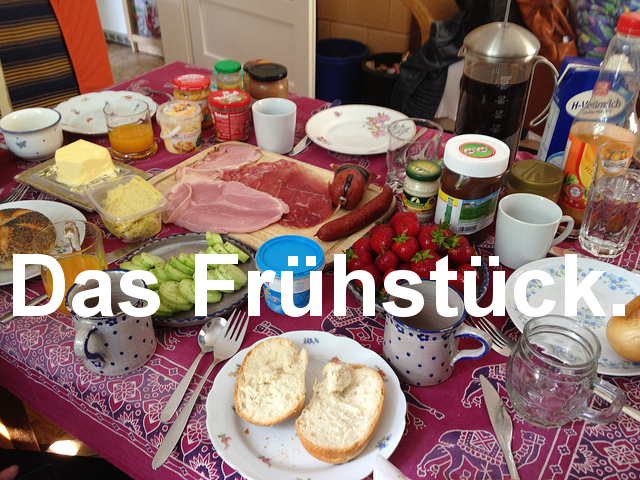The English language actually has a word for German breakfast: Dinner.
Although that’s not entirely fair since most dinners have far less bread and meat than a German breakfast.
Unlike most other food cultures, Germans don’t crow so much about their breakfasts. Not like the Brits and their Full English or us Amis and our pancakes and bacon or even the French and their croissant. Italians? Italy doesn’t have breakfast: They just sip espresso and look good. It’s true, Italian’s wake up looking good. I know. I’ve been.

But Germans don’t go on and on about their breakfasts mainly because they’re so busy trying to eat said breakfasts. The cornerstone of every German breakfast is the country’s true pride: Bread. I know you think it’s cars or beers but that’s just for show. Germans are mostly passionate about their flour, yeast and water all baked up into a hell for the gluten-averse.
German breakfasts are centered on a mini version of bread, the Brötchen (tiny loaf of bread). Brötchen come in various forms from boring white rolls to complex conflagrations of seeds, nuts, high-tech flours and tears from Nietzsche. Each Brötchen is cut in half, buttered and then belegt (covered) with anything you want but preferably an animal product and probably meat. Schinken, for example, a German ham. Or Leberwurst, which is predictably liverwurst.
German breakfast is what’s for breakfast
On a good day German Frühstück (breakfast) judges will also allow jam, Nutella, scrambled eggs and the occasional vegetable on a Brötchen. Some Germans even have a strange syrupy stuff called Goldsaft (Gold Juice, really!) on their breakfast tables, which is sugar beet syrup and is odorless and tasteless and not even sticky. It’s only on people’s tables because it’s called Gold Juice and who doesn’t want a little Gold Juice on their table?
Ne’er do wells, idlers and Bayern Munich fans, that’s who.
As if all of that isn’t enough, many Germans also include a soft-boiled egg to break their fast. They see it more as a way to cleanse the pallet, I think. Like an ovo-sorbet.
I’ve never been clear on what the suggested serving size is for a German breakfast but I’m usually full after two Brötchen halves (or one Brötchen for the math majors among us). But I generally eat two full Brötchen because, to quote Louis C.K., I don’t quit eating when I’m full. I quit eating when I hate myself.
Like a good German.
The first time any non-German encounters a Teutonic petit dejeuner, their reaction is always the same: How do Germans start the day like this and not end up looking … American? Heck, I still have that reaction every time I have a German breakfast. Because, if I eat German breakfasts too often, I end up looking American. Or, rather, more American. But I don’t know how they do it. I’ve shared living space with a German for 14 years and shired two half-Germans and still have no idea.
Frühstücksersatzverdauungsmagen
How they pull it off is a state secret more protected than the UFOs at Roswell or Heino’s eye color. The only way I can explain it is that Germans have an extra stomach. Like cows. They have a Frühstücksersatzverdauungsmagen (second German stomach) where the basic laws of nutrition, thermal dynamics and maybe even gravity are moot. The Frühstücksersatzverdauungsmagen digests breakfast foods in another dimension and encourages Germans to make cars, beer and horrible pop music while eliminating any and all calories.
There is no other answer. And Frühstücksersatzverdauungsmagen is a real word. Swear.
After writing all of that I’ve decided we’re having a German breakfast for dinner which Germans do too: It’s called Abendbrot (evening bread).
Because you can never have enough bread.
I’m really enjoying this blog! I’ve never even been to Germany, but your writing style is so refreshing. Thank you.
Hey thanks! I’m really enjoying writing it and I really appreciate the nice feedback.
Thid is so funny. I most allways lose my appetit when it comes a cold German I make whatever I like normaly its the American way but only if I have time. If not simple toast jelly & butter,cereal or I just skip it & have a Eichbaum beer
WTF
Is beer ever wrong?
Frühstücksverdauungsersatzmagen works better for your Frühstückserstazverdauungsmagenlegitimationsaufsatz.
[…] we should just stop cooking and eat German breakfasts for every meal. That would make it all a lot […]
[…] Thanks to the necessity of store-brand knock-offs, there are infinite numbers of chocolatey hazelnut spreads in Germany (and beyond) these days. Some are more hazelnutty, others are more chocolatey and some are just a cloying goo that begs the question of why they were ever produced (usually served at downmarket hotels and corporate breakfast buffets). But for me, only three hazelnut spreads have made it into the canon of hazelnut spreads – Nutella, Nudossi and Nusspli. The complexities of familial politics mean that only Nutella ever lands on our table but, thanks to this blogpost, we will now, for a time, also have the other two. And by “complexities” I mean “my children’s preference”. Though it rarely shows up on list of things that are über-German, Nutella is as much a part of the German experience as airing out a room, Oktoberfest and white asparagus. If there’s no hazelnut spread on the breakfast table, then you can be sure it’s not an authentic German breakfast. […]
How is Goldsaft served? Is it refrigerated, room temperature or heated? My cousin sent me some and I’m afraid to ask.
We always just put it on bread, like honey. You don’t need to refrigerate it because it’s just sugar. I guess you can also bake with it but I never have..
Spread some salted butter liberally on half a Brötchen, then drizzle the Goldsaft over it delicately. Not too much — let the butter shine through! I really like this combination of salty and sweet.